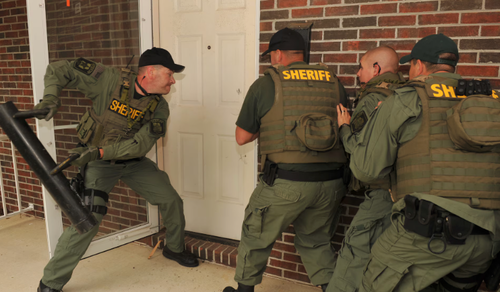By Aidan Johnston, Director of Federal Affairs for Gun Owners of America,
The Department of Justice under Attorney General Pam Bondi is advancing an argument that threatens to hollow out the Fourth Amendment's core protection: that Americans may be secure in their homes against warrantless searches.
The lawsuit is Case v. Montana. After a difficult breakup, William Trevor Case was at home alone when police arrived for a so-called "welfare check." They spent nearly an hour outside his house. Officers walked around the property, shined flashlights through windows, and even discussed calling his relatives or reaching him directly. They never did. Instead, they retrieved rifles and a ballistic shield, broke down his door without a warrant, and shot him.
Case survived, but his rights did not.
The Montana Supreme Court upheld the police's warrantless entry. Apparently, the government's "reasonable suspicion" that Treavor Case might need "help" was sufficient to justify an armed warrantless intrusion into his home. That standard is alarmingly low. The Fourth Amendment requires probable cause and judicial approval before government agents may enter a home. It does not permit entry based on a hunch.
And it was not as if obtaining a warrant would have been difficult. A recent Harvard Law Review study found that 93 percent of warrants are approved on first submission, often in less than three minutes. With modern technology, police can draft and submit warrant requests directly from their phones. The officers in Montana had nearly an hour to seek judicial approval. They chose not to.
The U.S. Supreme Court addressed a similar issue in Caniglia v. Strom in 2021. In that case, officers entered a man's home without a warrant after a domestic dispute, claiming they were acting as "community caretakers." The Court unanimously rejected that argument. Justice Clarence Thomas wrote that the Fourth Amendment's protections do not vanish just because police say they are trying to help. The Court allowed for true emergencies—cases of imminent harm or death—but drew a clear line against open-ended "caretaking" exceptions.
The facts in Montana look nothing like an emergency. Body camera transcripts reveal that officers themselves doubted that Case required immediate aid. One noted that "chances are pretty slim" he needed urgent medical attention. They discussed staging medical personnel outside but decided against it. After forty minutes of hesitation, they declared the situation an "emergency" and broke in anyway.
In any other context, an armed entry without a warrant would be understood as unlawful. The Constitution does not stop at the property line of a gun owner. If a homeowner responds defensively to armed intruders, the law recognizes the basic right of self-defense. What transforms that same scenario into a police action is supposed to be the warrant requirement. Strip that away, and the police have no more right to enter than anyone else.
Pam Bondi's Department of Justice, however, has sided with Montana.
In an amicus brief, DOJ argued that when police are "providing aid" rather than investigating a crime, they should not need probable cause or a warrant. That claim, if accepted, creates a dangerous loophole: police may simply reframe their role to avoid constitutional limits.
The risks are obvious. A neighbor calls for a welfare check. Officers arrive, say they are caretakers, and enter without a warrant. Inside, they confront a homeowner startled by strangers in his house. The encounter escalates, and the mere presence of a firearm becomes justification for force. What began as a welfare check ends as a shooting.
The Framers wrote the Fourth Amendment to prevent precisely this kind of abuse.
Judicial oversight was designed to ensure that government agents could not force their way into private homes unless a neutral magistrate agreed the evidence justified it. By lowering the bar from probable cause to suspicion, the Montana court has eroded that safeguard.
Caniglia was unanimous and recent. For Pam Bondi's DOJ to back Montana in this case is not simply inconsistent with precedent; it also undermines the Fourth Amendment principle that the home is a place of security. If the Supreme Court accepts this reasoning, the Fourth Amendment will be reduced to a formality.
Loading recommendations...
